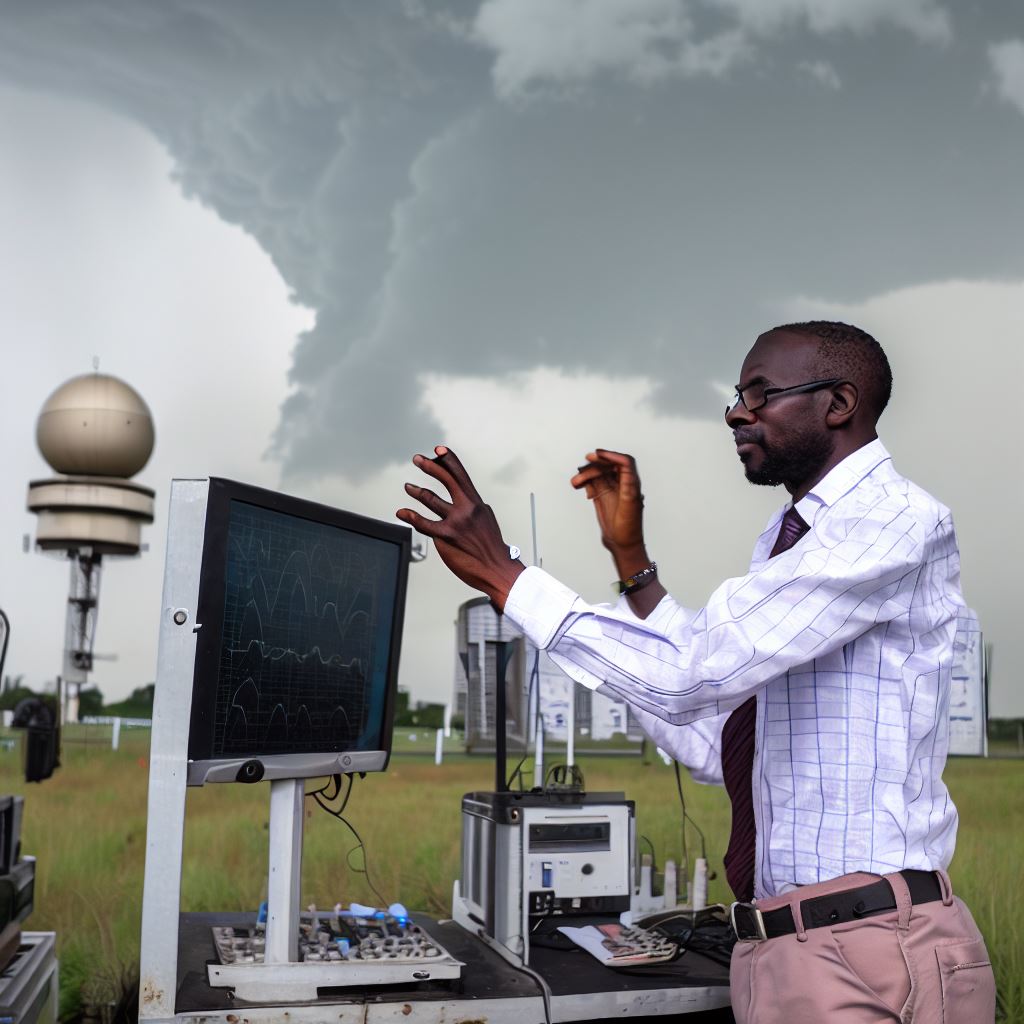Introduction
Nigeria’s weather stations, often overlooked, are crucial for meteorological science. This analysis adopts a scientist’s viewpoint to unveil their importance.
Weather stations, dispersed across the country, silently gather vital data—temperature, humidity, wind speed, and precipitation.
This information is the bedrock of scientific research and numerous sectors that influence our daily lives.
From a scientist’s perspective, weather stations are vital for comprehending climate patterns, monitoring climate change, and predicting severe weather events.
Meticulous analysis of this data offers invaluable insights into our environment.
It reveals long-term climate trends, informs decisions in agriculture and water management, and facilitates early disaster warnings.
Throughout this analysis, we’ll explore the inner workings of these stations, the technologies they employ, and the challenges they face.
We’ll also highlight the role of dedicated scientists who maintain and interpret them.
Funding limitations, the need for modernization, and the significance of data-sharing in global climate research will be discussed.
You’ll come to appreciate their vital role in meteorology, agriculture, transportation, and disaster preparedness.
Importance of Weather Stations
Understanding Climate Patterns
Weather stations are essential for grasping climate patterns and making accurate weather predictions.
They continuously monitor atmospheric conditions and provide valuable data for climate research and local weather forecasts.
This data aids in decision-making for agriculture, transportation, and disaster management.
Weather stations play a pivotal role in advancing our understanding of climate patterns and ensuring preparedness for weather-related challenges.
Crucial Data for Various Sectors
Accurate weather data from stations is vital for sectors like agriculture, transportation, and disaster management.
Agriculture relies on it for planting and harvesting decisions. Transportation requires precise forecasts for safe routes.
Disaster management uses it for early warnings, saving lives and property. Weather data is the cornerstone for informed decisions and safety across diverse industries.
Monitoring Climate Change
Weather stations are vital for tracking climate change. They collect data on temperature, precipitation, and wind patterns.
Scientists use this data to predict climate scenarios and assess impacts on agriculture, transportation, and disaster management.
Weather stations are crucial in understanding and addressing climate change’s far-reaching effects.
Read: Atmospheric Research Centers in Nigeria: A Tour
Overview of Nigeria’s Weather Stations
General Introduction to Nigeria’s Weather Station Network
Nigeria’s weather station network plays a crucial role in monitoring and predicting weather patterns and climate changes.
With a vast and diverse geography, Nigeria’s weather stations provide valuable data for numerous industries and sectors.
Distribution and Density of Weather Stations across the Country
Nigeria’s weather stations are strategically distributed across the country to ensure comprehensive coverage.
The distribution is based on factors such as geographic location, population density, and climate variability.
These stations are strategically situated in both urban and rural areas to capture a wide range of weather conditions.
This extensive distribution ensures accurate data collection and analysis for the entire country.
However, the density of weather stations varies across different regions.
Urban areas and regions with high economic activity tend to have a higher concentration of weather stations compared to rural and less-developed areas.
This allows for more precise weather forecasting and climate monitoring in densely populated regions.
Types of Instruments and Technology Used in Weather Stations for Data Collection
Nigeria’s weather stations are equipped with various instruments and advanced technology that enable efficient and accurate data collection.
- One key instrument used in weather stations is the automatic weather station (AWS).
- These stations are equipped with sensors that measure various weather parameters such as temperature, humidity, wind speed, and precipitation.
- The data collected by AWSs is automatically transmitted to a central database for real-time monitoring and analysis.
- In addition to AWS, weather stations also utilize other instruments such as barometers, anemometers, rain gauges, and weather balloons.
- These instruments provide important data for meteorologists and climate scientists to understand weather patterns and climate dynamics.
- Furthermore, Nigeria’s weather stations are increasingly incorporating remote sensing technologies such as satellite imagery and radar systems.
- These technologies provide a comprehensive view of weather systems and help in tracking severe weather events like hurricanes, thunderstorms, and floods.
Overall, Nigeria’s weather station network is essential for understanding and predicting weather patterns.
Strategic weather station placement and advanced tech ensure precise data collection. It benefits agriculture, aviation, disaster management, and climate research.
Evaluation of Data Collection Methods
Methods Used to Collect Weather Data in Nigeria
- Automatic weather stations: These modern marvels are equipped with advanced sensors and instruments.
They continuously record temperature, humidity, wind speed, and precipitation. Data is transmitted in real-time, enabling swift analysis and forecasting.
These stations are the backbone of our weather monitoring system. - Manual observations: Skilled meteorologists conduct manual observations at various weather stations across the country.
They record data on temperature, wind direction, cloud cover, and atmospheric pressure.
These observations complement automatic data and add a human touch to weather analysis. - Satellites: Orbiting high above the Earth, satellites provide a broader perspective. They capture images of cloud cover, ocean currents, and atmospheric conditions.
These images are invaluable for tracking weather systems, monitoring climate change, and predicting severe weather events.
The collection of weather data in Nigeria involves different methods, including automatic weather stations, manual observations, and satellites.
Strengths and Weaknesses of Each Data Collection Method
Automatic weather stations
These stations use sensors and instruments to collect data automatically.
- Strengths: They provide real-time data, continuous data collection, and reduced human error.
- Weaknesses: It is expensive to install and maintain, requires a power source, and possible technical malfunctions.
Manual observations
Trained personnel make direct observations and record data manually.
- Strengths: Lower initial cost, flexibility to measure various parameters, and can provide qualitative observations.
- Weaknesses: It has the potential for human error, subjective interpretation, and limited coverage and frequency.
Satellites
Remote sensing satellites monitor and collect data from space.
- Strengths: It has a wide coverage area, provides large-scale data, and ability to detect changes over time.
- Weaknesses: Expensive technology, dependence on weather conditions, and limited ability to measure certain parameters.
Variations in Data Quality and Reliability
The chosen data collection method significantly impacts the quality and reliability of the data.
- Automatic weather stations: The data quality is generally high due to reduced human error and continuous monitoring.
- Manual observations: Data quality may vary depending on the expertise and attentiveness of the personnel.
- Satellites: Data reliability is affected by atmospheric conditions and the limitations of satellite technology.
It is crucial to consider these variations in data quality and reliability when analyzing and interpreting weather data collected in Nigeria.
Each method has its pros and cons. Choose based on factors like cost, coverage, and parameters to measure.
Establishing a robust data collection system is vital for ensuring accurate and reliable weather information for forecasting, research, and agriculture.
Read: Climate Research in Nigeria: Atmospheric Scientists

Analysis of Data Quality and Availability
The overall quality and reliability of weather data collected in Nigeria
The overall quality of weather data collected in Nigeria is a crucial factor for scientific analysis.
- Scientists need reliable data, but Nigeria faces challenges.
- Limited weather stations collect critical data on temperature, precipitation, and more.
- Funding, equipment, and training issues compromise data accuracy.
- Standardized protocols are lacking, risking errors in recorded data, and affecting long-term climate records and analysis.
Limitations or challenges faced by Nigeria’s weather stations
Nigeria’s weather stations face several limitations and challenges that impact the quality of collected data.
- Inadequate funding is a major challenge, leading to limited resources for maintenance and upgrades.
- Many weather stations lack modern equipment, hindering accurate data collection.
- Weather stations located in remote areas face additional challenges due to poor infrastructure.
- The lack of trained staff to operate the stations and analyze the collected data is another limitation.
These limitations collectively contribute to the challenges faced by Nigeria’s weather stations.
Without sufficient resources and support, it becomes difficult to ensure the reliability of the data.
The availability and accessibility of weather data for researchers and the general public
Access to weather data is crucial for researchers studying climate patterns and making projections.
The general public also relies on weather data for various purposes, such as planning outdoor activities.
In Nigeria, the availability and accessibility of weather data vary depending on the source.
- Government agencies, such as the Nigerian Meteorological Agency (NiMet), collect and provide weather data.
- However, the availability of this data to researchers and the general public can be limited.
- Sometimes, access to detailed or historical data may require special permissions or subscriptions.
- NiMet’s online platforms and data portals have improved accessibility to some extent.
- However, gaps in data availability, especially from remote areas or less-equipped stations, still exist.
- To ensure better accessibility to weather data, efforts should be made to improve data sharing and collaboration.
- Collaborations between government agencies, research institutions, and international organizations can enhance data availability.
- Investments in modernizing weather stations and training staff are also essential for reliable and accessible data.
In fact, the overall quality and reliability of weather data in Nigeria face several limitations and challenges.
Inadequate funding, outdated equipment, and a lack of standardized protocols impact the data’s accuracy.
Weather stations need more resources and support to ensure reliable data collection.
The availability and accessibility of weather data for researchers and the general public vary depending on the source.
Efforts should be made to improve data sharing, collaborations, and investments in modernizing weather stations to enhance data availability and accessibility.
Read: Atmospheric Science Jobs in Nigeria: A Guide
Applications of Weather Data in Nigeria
Short-Term Weather Forecasting and Predicting Extreme Events
Weather data in Nigeria is crucial for short-term weather forecasting.
- It helps in predicting extreme weather events like hurricanes, storms, and floods.
- This information allows authorities to issue timely warnings and implement disaster preparedness measures.
- By analyzing weather data, scientists can better understand the patterns and dynamics of such events.
- Accurate forecasts help to minimize damage to infrastructure and save lives in Nigeria.
Application of Weather Data
Weather data plays a vital role in agriculture in Nigeria.
- It helps farmers plan planting and harvesting schedules based on rainfall patterns.
- Accurate weather data assists in irrigation management, preventing both water scarcity and excess usage.
- Public health officials rely on weather data to identify climate-related health risks.
- For example, forecasting heatwaves can prompt the implementation of heat advisories to protect vulnerable populations.
Role of Weather Stations in Climate Modeling and Predicting Long-Term Climate Trends
Weather stations provide crucial data for climate modeling in Nigeria.
- Scientists use this data to understand climate variability and predict long-term climate trends.
- Monitoring weather patterns over a long period helps in recognizing climate change indicators.
- Information gathered from weather stations is used to develop climate models and predictions.
- These models aid in formulating climate change mitigation strategies and policies in Nigeria.
Weather data in Nigeria serves a wide range of applications, from short-term forecasting to long-term climate modeling.
By analyzing this data, scientists can accurately predict extreme weather events and patterns, allowing for timely warnings and disaster preparedness measures.
In agriculture, weather data helps farmers plan their activities, optimize water resource management, and prevent health risks.
Weather stations play a vital role in climate modeling and trend prediction, aiding climate change strategies in Nigeria.
Future Improvements and Recommendations
Potential Improvements in Nigeria’s Weather Station Network
- Increase the number of weather stations across Nigeria to improve data accuracy.
- Upgrade existing weather stations with advanced instruments and automated monitoring systems.
- Enhance maintenance and calibration procedures to ensure reliable and consistent data collection.
- Implement regular training programs for weather station personnel to improve their skills and knowledge.
- Foster collaborations with meteorological institutions and research organizations for expertise exchange.
Need for Investment in Modern Technologies and Infrastructure for Data Collection
- Invest in state-of-the-art weather monitoring technologies such as Doppler radar and satellite systems.
- Upgrade communication infrastructure to facilitate real-time data transmission and analysis.
- Establish a centralized data processing and storage facility equipped with high-performance computers.
- Develop robust data management systems to efficiently handle large volumes of meteorological data.
- Collaborate with international organizations to access funding for technological advancements.
Strategies for Enhancing Data Dissemination and Collaboration with International Weather Agencies
- Establish an online platform for public access to timely and accurate weather information.
- Develop partnerships with international weather agencies to exchange data and expertise.
- Implement standardized data formats and protocols to enable seamless data sharing.
- Participate actively in international meteorological conferences and workshops to foster collaboration.
- Engage in joint research projects with international weather agencies to enhance scientific understanding and forecasting capabilities.
In short, Nigeria’s weather station network requires various improvements and investments to enhance its accuracy, reliability, and effectiveness.
Increasing stations, tech upgrades, infrastructure improvements, and international collaboration will boost Nigeria’s weather forecasting.
These enhancements will benefit Nigeria and advance global meteorological knowledge, aiding climate change adaptation strategies.
It is crucial for Nigeria to prioritize these recommendations and work towards building a robust and modern weather station network.
Read: Meet Nigeria’s Top Atmospheric Scientists: A Review
Conclusion
In Nigeria, weather stations stand as vital pillars of meteorological knowledge. These stations tirelessly gather data daily.
The significance of accurate weather data resonates across sectors like agriculture, transportation, and disaster preparedness. They all rely on it.
For farmers, knowing when to plant crops is a game-changer. Efficient transportation relies on precise weather forecasts for safe journeys.
Disaster preparedness hinges on early warnings provided by weather stations. Lives and property are safeguarded through timely information.
Meteorologists and scientists, the unsung heroes behind these stations, work diligently. They analyze and interpret the data.
Their dedication ensures timely interventions during extreme weather events. Society benefits as disaster risks are mitigated.
In closing, weather stations in Nigeria are the silent guardians of our well-being. Accurate data empowers us.
Scientists play a pivotal role, not just as observers, but as interpreters and guides. They turn data into actionable insights.
The role of scientists in utilizing weather data for societal benefit cannot be overstated. Their dedication transforms raw numbers into lifesaving information.
As we move forward, let’s remember the importance of these weather stations and the scientists who make them possible. They keep us safe and informed.




